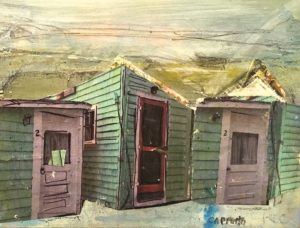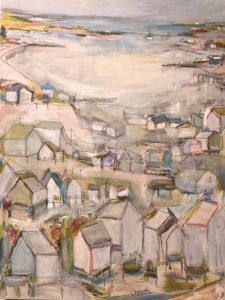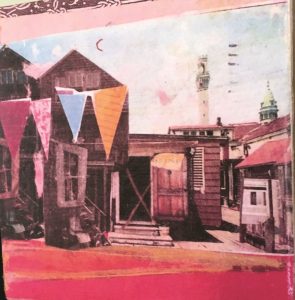Richard Cuencas holds a silver ring in his hand. “This was once a fork,” he says. “And this is made with black coral from the beach.” He points to a barrette he made by hand.
Cuencas, whose R.C. Jewelry shop is in Whaler’s Wharf, will be one of 15 vendors showing and selling their work at the Makers Market on May 18 and 19 at the Provincetown Commons.
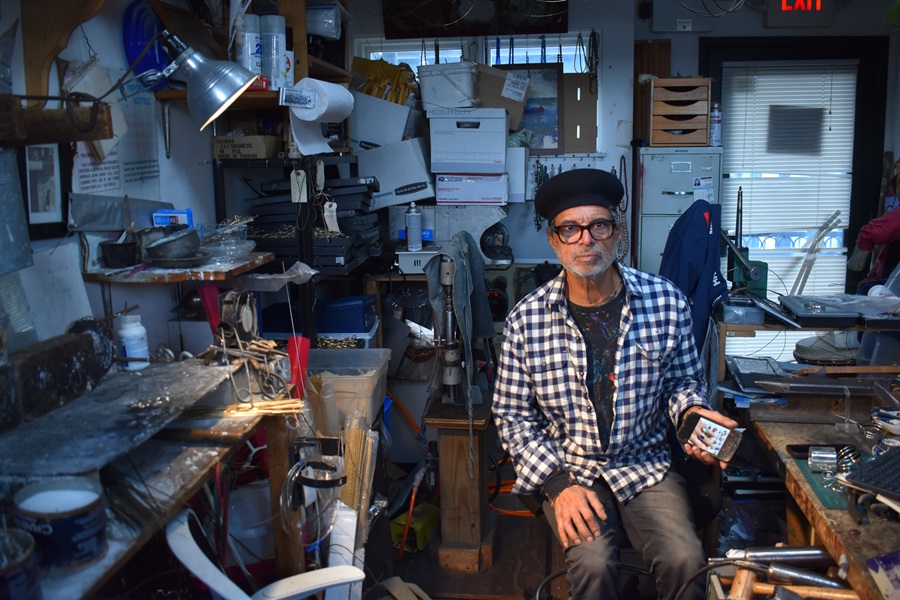
Cuencas didn’t come to Provincetown to become a craftsman. He arrived in 1976 unsure what he would do, and right away Reggie Cabral hired him as a bartender at the Atlantic House, he says. But in 1980, Dale Elmer helped him find his calling.
Elmer had created Whaler’s Wharf in 1973, according to David W. Dunlap’s Provincetown Encyclopedia, by buying Victor Lewis’s 237 Commercial St. building, including the Provincetown Theater’s 600-seat venue dating to 1919. When Elmer opened his own shop, the Handcrafter, next door, it was a first step toward his dream of creating an artisans’ collective.
“Dale Elmer was a master crafter himself in metal jewelry, wood, and recycled material,” says Cuencas. Elmer put the first three pairs of earrings Cuencas ever made in the window at the Handcrafter. “He gave me some tools, and I got going,” Cuencas says, and he’s been making jewelry by soldering found metals around stones and other objects found in nature ever since.
Elmer gave all sorts of artists their starts at Whaler’s Wharf, says Cuencas, who was able to open his own shop there in 1995 while still making pieces for the Handcrafter. “My rent back then was $3,000 for the summer,” he says. “Dale was very generous in that sense. He wanted to help people and their businesses.”
The crafts collective nearly disappeared in 1998, when Whaler’s Wharf burned down. Cuencas lost all his jewelry. He keeps a photo of the ruins left after the fire and points to the spot where his shop once stood. After the fire, Elmer set up 12 garden sheds for crafters to use that summer. “He didn’t charge us for anything,” says Cuencas.
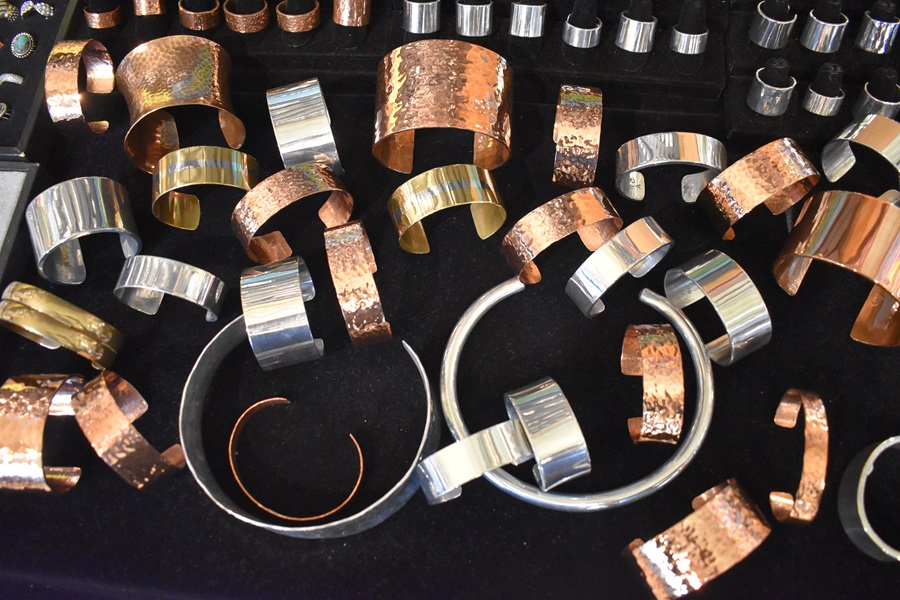
Cuencas moved his shop to 144 Commercial St. temporarily until Whaler’s Wharf was rebuilt. During that time, he started collecting and selling works by others who had lost their businesses in the fire — “paintings, consignment jewelry, stained glass windows,” he says. “That’s how I built up my shop.” He still represents most of those artisans today.
When Cuencas gets an idea, the first thing he does is draw it. He pulls out a notebook: this, too, is handmade, by Sylvia Tomayko-Peters, whose Provincetown letterpress business is called Middle Dune.
“It’s a doodle,” he says, looking at a recent sketch. “It doesn’t mean anything yet, but it’s going to help. Some people are very neat in their creative process. I am not.”
Cuencas works in all kinds of metals, from aluminum and brass to silver and gold. He likes to recycle: “I make stuff out of aluminum cooking trays and copper shutters,” he says. He uses a piece of railroad track to hammer and texture the metals. If he wants to create a dome shape for a piece, he hammers it on a car hitch he keeps in the back of his studio.
“This is where the magic is done,” he says as he shines a ring on the polishing machine.
An Artist’s Other Side
Provincetown artist Karen Cappotto will also be one of this year’s Makers Market vendors. Though she’s known for her oil paintings, “I’ve always had two studios,” she says.
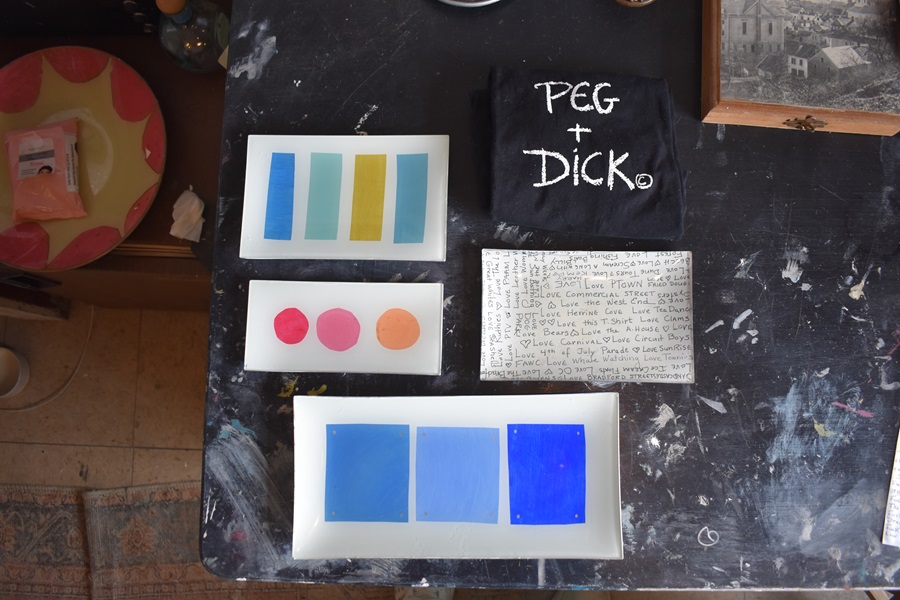
She’ll be at the market with plates and other crafts she makes under her brand Peg & Dick — the name honors her parents. Although Cappotto once designed plates and collages for Mitchell Gold and Bob Williams, “Each one of my plates is one of a kind,” she says, “which must have driven them bananas. Local sustainability and cottage industry are Peg & Dick’s philosophy.
“Especially with AI, handmade evidence, the handmade thing, is very important to me,” Cappotto adds. She pulls out a decoupage plate and explains her process. “I paint paper,” she says. She stacks seven layers of glue and paint, covering both sides of the surface she’s decoupaging.
Spinning and Weaving
Ken Albert was between jobs when he first came to town a decade ago.
“I had a winter rental,” he says. “I thought I was going to relax for six months and go back and join the world.” He pauses: “I don’t think I’ll be rejoining the world. I find P’town beautiful 12 months a year. I have never looked out on that harbor and thought it wasn’t lovely.”
Albert makes placemats, napkins, and tea towels on his four-shaft loom, and he double-weaves on his eight-shaft loom. “I come up with my own patterning,” he says, holding up a merino wool and tinsel scarf. “A scarf like this would probably take 15 hours of straight weaving.” He tries to weave for three or four hours a day, every day.
Fiber arts have been his craft for 30 years. Albert has a graduate degree in higher education counseling from Northeastern University. But no sooner had he finished his studies, he says, “I started spinning yarn.” He started out working with wool; he also spins silk on a traditional spinning wheel.
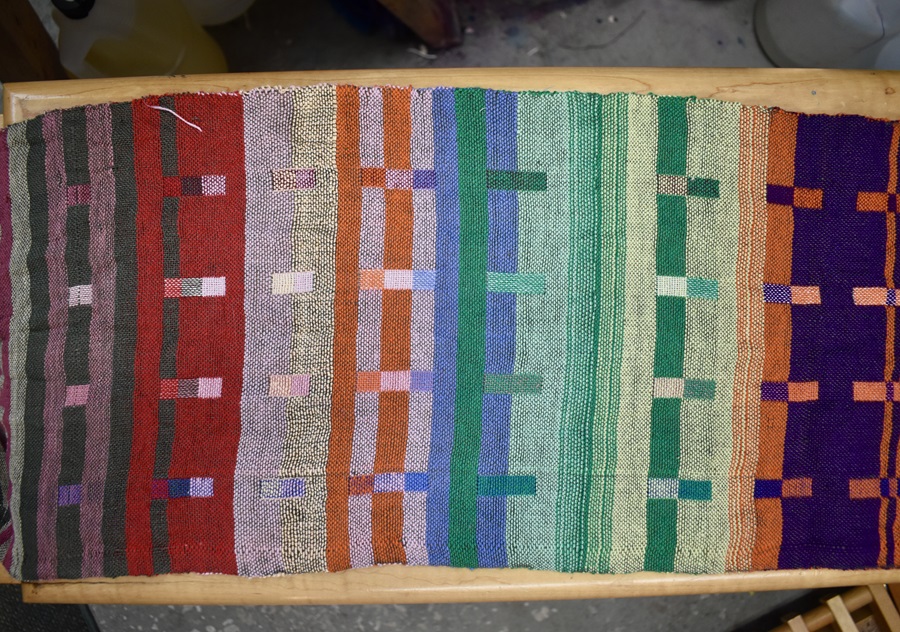
He heard about a spinning retreat in Maine in the late 1990s, he says. When he got to Sugarloaf, he realized it was a ski resort.
“Everyone was staying in a ski condo, six bedrooms in a condo, and all women,” he says. “They were trying to figure out where to put me because I was the only man, and I said, ‘Oh Lord, you have nothing to worry about!’ ”
The retreat was three days long. “Those were some good, tough Maine farm women,” he says. “I learned a lot.” That’s when he added dyeing to his repertoire.
He always knew how to weave, he says, but didn’t make it his focus until he found his two-loom studio off Route 6.
A workshop in Scotland this past winter has put him on a new path: tapestry weaving. It’s closer to painting than ordinary weaving, he says. “One strand at a time, you’re painting with wool.”
To assist in his creative endeavors at the loom, Albert is currently reading A Weaver’s Book of 8-Shaft Patterns: From the friends of handwoven, edited by Carol Strickler.
His craft works bring in some income, says Albert, but like many artisans he says it’s “not enough to live off of.”
When he’s not spinning, dyeing, and weaving, Albert is the general manager of the Provincetown Tennessee Williams Festival. “I started doing the bookkeeping and each year got a little bit more responsibility,” he says. He has been with the festival for nine years. He also works at the Boatslip Resort in the summer and at the Provincetown Council on Aging.
“I used to work the overnight phone for the Crowne Pointe and Brass Key,” he says, suggesting that those are stories for another time.
True Craftsmanship
The event: Makers Market
The time: Saturday, May 18 and Sunday, May 19, 2-8 p.m.
The place: The Provincetown Commons, 46 Bradford St.
The cost: Free

